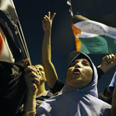
'Peace treaty is dying'
Photo: EPA
Analysis
Ron Ben-Yishai
Analysis: Bedouin tribes who profit from smuggling resort to terror to slow down Israeli fence construction
This is no longer the same Egypt. It is no longer the same border, the peace treaty is dying, and we better start to change our way of thinking.
The Sinai Peninsula has turned into a region controlled by one of the world’s strongest and largest crime cartels. “The Second Republic of Egypt” under the leadership of an Islamist president will direct the tensions between Israel and Egypt from political-territorial disagreements to a religious conflict.
It may not happen immediately, but we better give up the euphemisms now and stop declaring that we faced attacks from the Sinai during Mubarak’s era as well. Better get accustomed to the fact that Israel’s southern border, all of it, is a hostile border; a border of confrontation.
An Egyptian regime under Islamic leadership will not be able to accept Israeli airstrikes in Gaza. The day when Morsi is in power and the Air Force strikes the Strip, possibly killing innocents, will also be the day marking the end of formal relations between Israel and Egypt.
Monday night already saw rumors in Cairo about the movement of Israeli troops towards the Egypt border. In Israel, these rumors caused much concern. This is precisely the problem with the diplomatic-security establishment tasked with the “Egypt project” – it’s members continue to walk on eggshells, careful not to let the genie out of the bottle and clinging to the hope that international interests will safeguard the peace treaty. Yet the eggs under their feet are starting to crack, one after the other.
In the presidential elections, Sinai’s northern district voted for Islamist candidate Morsi. The southern, tourism-oriented district voted for the secularist Shafiq. This is not only a socioeconomic issue pitting a conservative, religious region against a region that makes a living from tourism. Northern and central Sinai are areas controlled by Bedouin tribes that in recent years have turned into a crime cartel in every way.
For a fee, they would carry out attacks again Israel, against Egypt, and against any other party. There is no smuggling operation - be it arms, goods, drugs or people - that does not go through this cartel.
Egypt headed for explosion
This cartel enjoys immunity as result of being located on Egyptian territory. Israel will not be violating Egyptian sovereignty to take care of this problem. The Egyptians are trying. This struggle even sees close cooperation between Egypt and Hamas, which also does not take pleasure in the cartel’s existence. Yet Egypt has no interest in investing efforts in this distant province; they have anarchy at home.
Monday’s terror attack is reminiscent of the attack on Highway 12 in August 2011. Back then it was Egyptian mercenaries, residents of Sinai, who were hired by the Popular Resistance Committees in Gaza to carry out the operation. And so, officials aiming to pinpoint the masterminds behind Monday’s attack need not search the terrorists’ bodies. They can be Palestinians living in Sinai, Bedouins, or Global Jihad members; they are all connected to the cartel. The question is who ordered this job and paid for it.
One thing is clear: Whoever carried out this attack wanted to ignite the border, and neither Hamas nor Egypt have an interest to do so at this time. Israel’s military establishment is preparing for the possibility that once the construction of the border fence is completed, in October this year, the cartel’s activity will shift to the sea, whether it is the Red Sea in Eilat’s or Jordan’s direction, or alternately, the Mediterranean.
Had the Muslim Brotherhood failed to win the elections, riots in Cairo would have erupted Monday already. The sense of victory delays the clash between them and the army. Yet this is merely a postponement of the inevitable. The Brotherhood won’t accept the fact that the army confiscated powers that belong to the president. The clash will erupt also if it turns out that the army is in no rush to call parliamentary elections.
The worse would be if after the count it turns out that Morsi did not win; after all, such miracles have already taken place in past Egyptian elections. In such case, should both sides not aim to accommodate each other, Egypt will explode.















